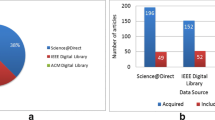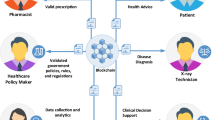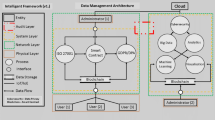Abstract
Automation is a direct result of digitalisation of different aspects of our lives. Where various functions have been automated, some are still being carried out manually. One such function is the verification of academic records which is still being done predominantly in manual fashion. Blockchain technology provides a solution for storing immutable records in distributed ledgers that can be verified anytime. This paper presents an architecture for digital verification of academic records using blockchain technology. The paper also presents an implementation of this architecture as a proof of concept.







Similar content being viewed by others
References
Xie, J., Tang, H., Huang, T., Yu, F. R., Xie, R., Liu, J., et al. (2019). A survey of blockchain technology applied to smart cities: Research issues and challenges. IEEE Communications Surveys & Tutorials, 21, 2794–2830.
Nijland, M., & Veuger, J. (2019). Influence of blockchain in the real estate sector. International Journal of Applied Science, 2(2), p22–p22.
Pieroni, A., Scarpato, N., Di Nunzio, L., Fallucchi, F., & Raso, M. (2018). Smarter city: smart energy grid based on blockchain technology. International Journal on Advanced Science, Engineering and Information Technology, 8(1), 298–306.
Zhang, P., Schmidt, D. C., White, J., & Lenz, G. (2018). Blockchain technology use cases in healthcare. In Blockchain technology: Platforms, tools and use cases, vol. 111 of Advances in Computers (pp. 1–41). Elsevier.
Nakamoto, S. (2008). Bitcoin: A peer-to-peer electronic cash system. https://bitcoin.org/bitcoin.pdf.
Zheng, Z., Xie, S., Dai, H.-N., Chen, X., & Wang, H. (2018). Blockchain challenges and opportunities: A survey. International Journal of Web and Grid Services, 14(4), 352–375.
Lemieux, V. L. (2017). Blockchain recordkeeping: A swot analysis. Information Management, 51(6), 20–27.
Buterin, V. (2015). On public and private blockchains. In Ethereum Blog. https://ethereum.org/.
Androulaki, E., Barger, A., Bortnikov, V., Cachin, C., Christidis, K., De Caro, A., Enyeart, D., Ferris, C., Laventman, G., Manevich, Y., et al. (2018). Hyperledger fabric: A distributed operating system for permissioned blockchains. In Proceedings of the thirteenth EuroSys conference (p. 30). ACM.
Author information
Authors and Affiliations
Corresponding author
Additional information
Publisher's Note
Springer Nature remains neutral with regard to jurisdictional claims in published maps and institutional affiliations.
Rights and permissions
About this article
Cite this article
Aamir, M., Qureshi, R., Khan, F.A. et al. Blockchain Based Academic Records Verification in Smart Cities. Wireless Pers Commun 113, 1397–1406 (2020). https://doi.org/10.1007/s11277-020-07226-0
Published:
Issue Date:
DOI: https://doi.org/10.1007/s11277-020-07226-0




